PHOTO: AbzasMedia journalist Elnara Gasimova taken to the court (Voice of America)
1/ KEY FINDINGS
In Azerbaijan, 147 incidents involving attacks/threats against media professionals, citizen journalists, editorial offices of traditional and online publications, and online activists were identified and analysed during the research for 2023. Data for this study was collected through open-source content analysis in Russian, Azerbaijani, and English. Additionally, information about these attacks was sourced from media reports, accounts from journalists and bloggers, and statements from lawyers who provide legal assistance to journalists. A list of the primary sources is included in Annex 1.
- From the final months of 2023, unprecedented persecution of independent and critical media and journalists emerged. As a result, over 20 journalists and media workers are currently imprisoned in Azerbaijan, most independent online media outlets have been shut down, and any form of pluralism is under severe threat.
- The government has also sought to silence its critics abroad. In August 2024, Afgan Sadygov, an Azerbaijani journalist residing in Georgia, was arrested, and his extradition to Azerbaijan has already been requested. Azerbaijani authorities have charged Sadygov with “threatening to spread offensive information” for extortion purposes. Sadygov has faced severe repression in Azerbaijan and had previously been imprisoned in his home country.
- The new Media Law, adopted in 2022, has been fully enforced. Fewer than 10% of existing media outlets were included in the new Media Register, leaving the majority de facto illegal.
- Media organisations that did not apply to be included in the Media Register have had their activities terminated by court order, and further media work has been prohibited.
- Attacks on media workers collecting information from public gatherings continued. None of these attacks were officially investigated.
2/ THE POLITICAL SITUATION AND THE MEDIA IN AZERBAIJAN
In the 2023 World Press Freedom Index by Reporters Without Borders, Azerbaijan is ranked 151 out of 180 countries. While Azerbaijan improved its position by three places compared to the previous year, Reporters Without Borders attributes this relative progress not to any positive developments in media freedom within the country, but rather to a deterioration in the rankings of other countries. According to Reporters Without Borders, “President Ilham Aliyev has eradicated any semblance of pluralism, and since 2014, he has relentlessly pursued efforts to silence any remaining critics.”
In the Freedom in the World 2023 report by Freedom House, Azerbaijan received a score of just 9 out of 100 possible points and was classified as “Not-free”. This classification has persisted for over 15 years. The organisation highlighted that Azerbaijan’s parliament has imposed further restrictions on media organisations and journalists. In Freedom House’s Freedom on the Net 2023, Azerbaijan was also listed as a country where the Internet is not free. The report noted key restrictions including the blocking of social media platforms and websites with political, social, and religious content, as well as the manipulation and trolling of online discussions by pro-government commentators.
In 2023, the new Media Law, adopted the previous year, was fully implemented. This law mandated the creation of a single register for all media and journalists. The register has been established, and ten independent media outlets have been formally refused entry. The refusal to be included in the register imposes significant restrictions on the exercise of journalistic rights. Despite appeals from media outlets to the courts, all complaints were rejected, with decisions based solely on the new law. For the first time in Azerbaijan, a media outlet’s operations were terminated for not applying to the register, and its website was blocked without a court warrant.
3/ GENERAL ANALYSIS OF ATTACKS
In 2023, 147 attacks against journalists, bloggers, and other media workers were recorded in Azerbaijan. This figure is roughly consistent with the 159 incidents reported in 2022.
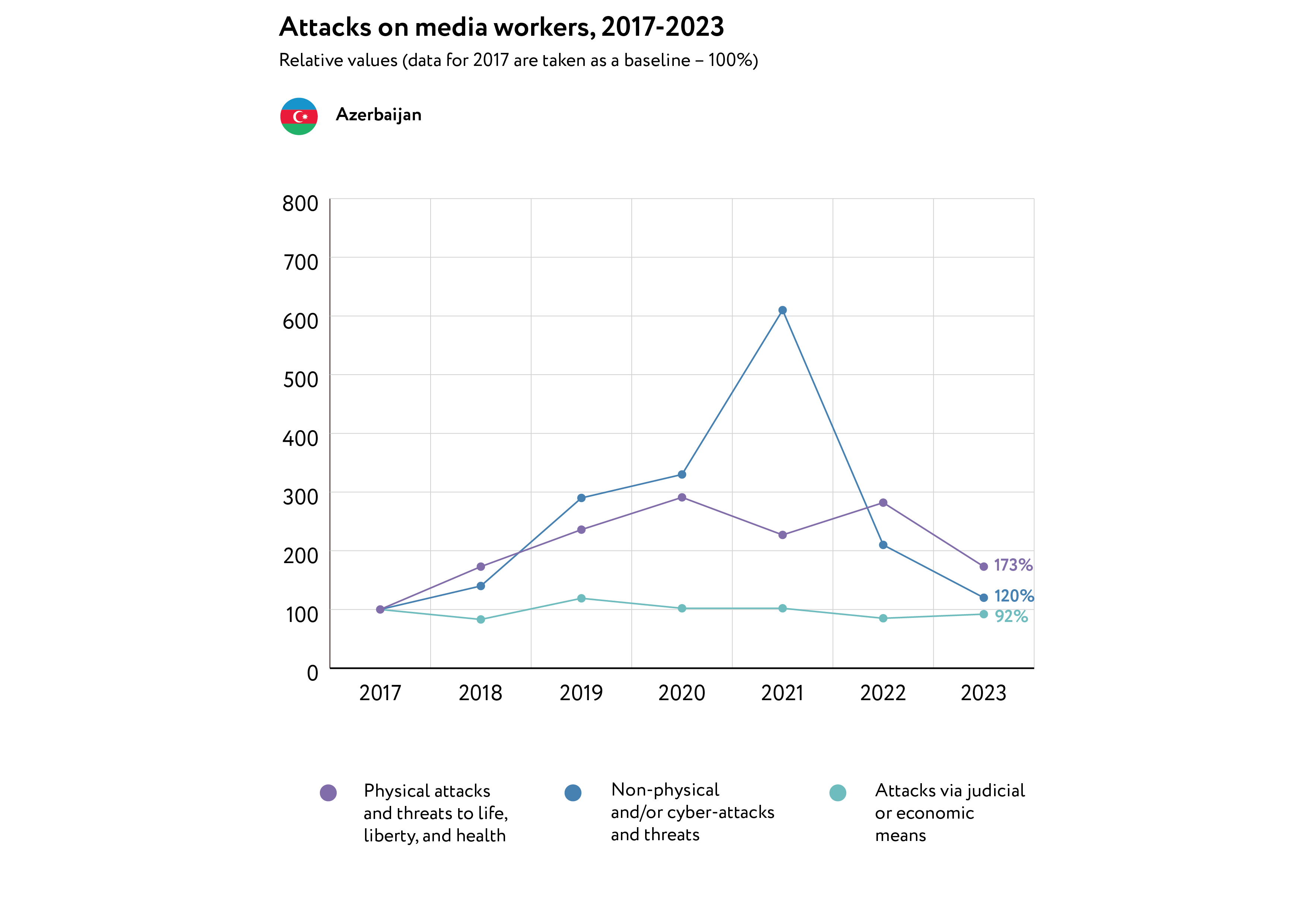
Attacks via judicial and/or economic means continued to be the primary method of exerting pressure on media workers in Azerbaijan. The frequency of non-physical and cyber-attacks halved compared to 2022, and there was also a reduction in the number of physical attacks from the previous year.
In 89% of cases, government officials were responsible for attacks against media workers, while 11% of attacks were carried out by individuals not associated with the authorities.
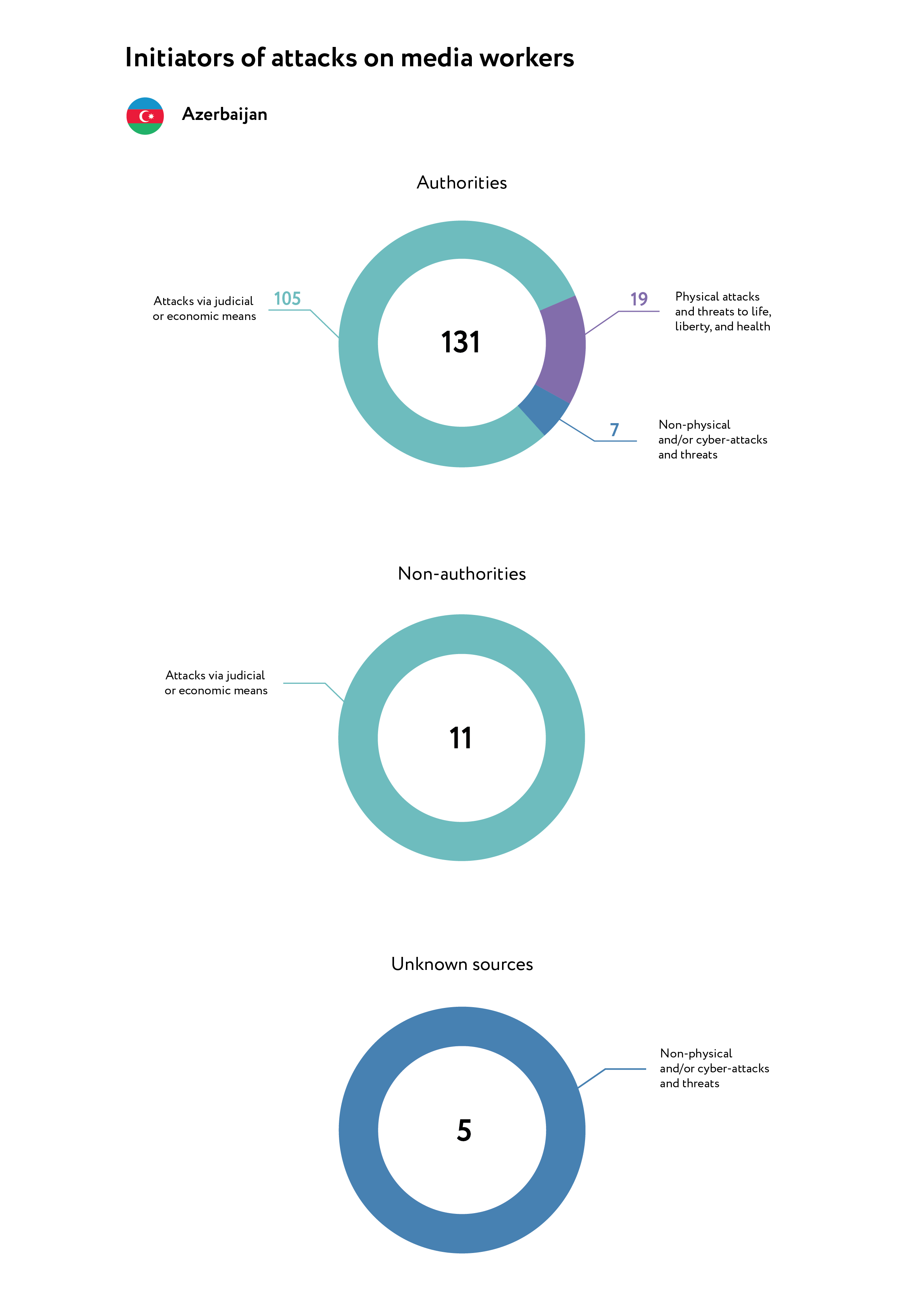
4/ PHYSICAL ATTACKS AND THREATS TO LIFE, LIBERTY AND HEALTH
In 2023, 19 physical attacks against media workers were recorded in Azerbaijan. The majority of these incidents occurred while journalists were covering mass protests and gatherings. All recorded attacks were perpetrated by representatives of the authorities.
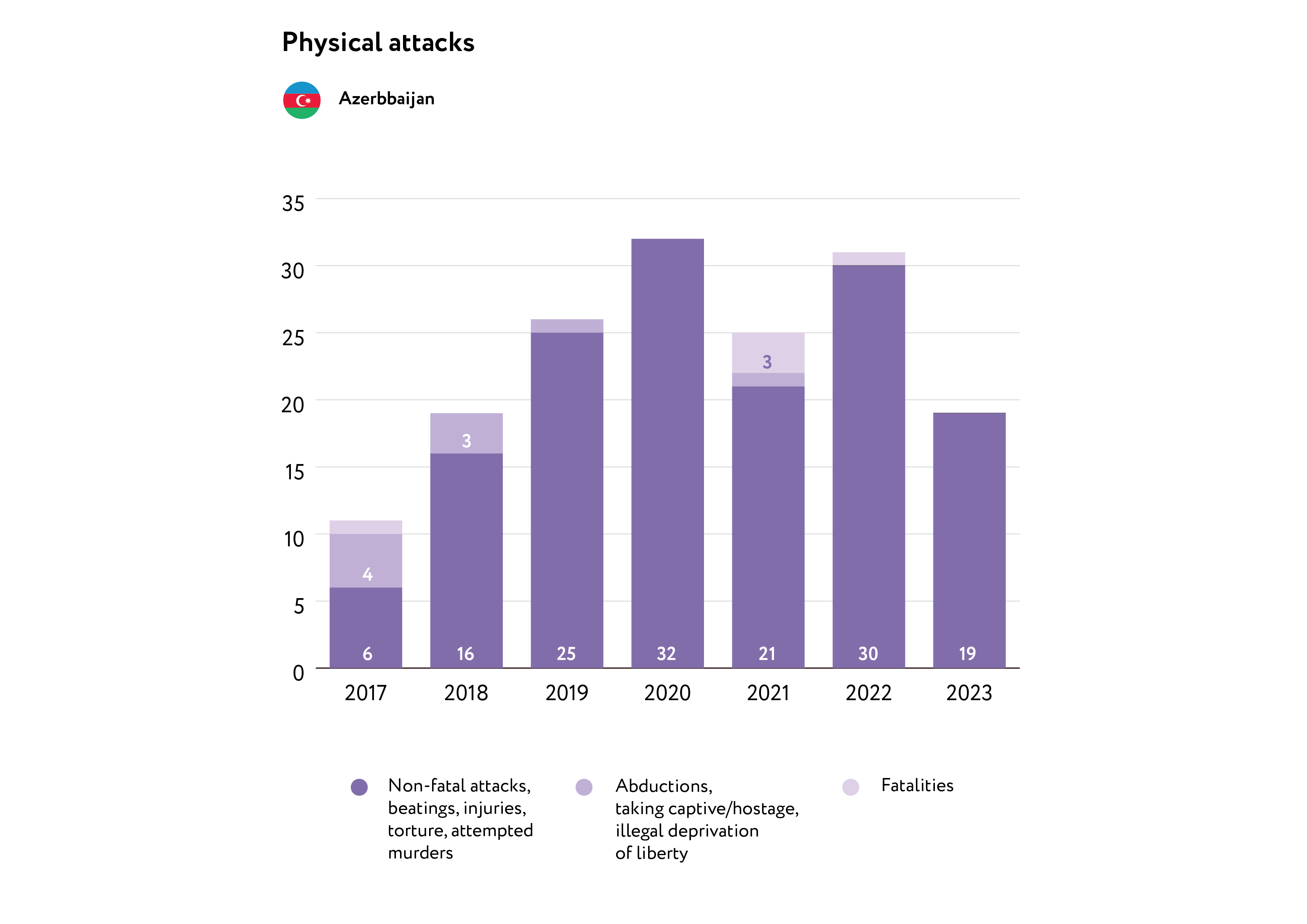
- On 30 March, Jamila Azimova, a journalist from the online TV channel Kanal11, was physically assaulted while covering a protest organised in Baku by activists from the opposition Azerbaijan Popular Front Party. Another journalist, Nurlan Jafari from Time TV, was also attacked during the protest, resulting in physical harm and damage to his mobile phone.
- On 26 May, in a court in Ganja city, Sevinj Sadigova, a journalist with Azel TV, was assaulted by court guards and police officers. They struck her hands and forcibly removed her from the courtroom to prevent her from covering the trial of her colleague, Mr Osman Rzayev (Narimanoglu), the head of the Demokratik.az website.
- On 16 June, Fatima Movlamli, a journalist with Toplum TV, was injured while covering a protest rally when a police car ran over her foot. She was taken to a trauma hospital for examination, but the facility refused to provide her with a medical report or confirm her injuries.
- On 22 June, in Soyudlu village, Gababay District, Azerbaijan, where villagers protested against ecological hazards from a gold mine cyanide reservoir, independent journalists covering the protest were subjected to physical abuse. Elmaddin Shamilzade, an independent journalist, faced police brutality when he refused to delete his recordings. Officers assaulted him with fists and truncheons, pulled his hair, kicked him in the stomach, and threatened him with rape. He lost consciousness for approximately five minutes. Shamilzade was then taken to the Baku City Head Police Department and threatened with arrest if he reported the mistreatment. Other journalists covering the protest—Nargiz Absalamova from Abzas Media, Nigar Mubariz from Voice of America (“Amerikanın Səsi”) Radio, and independent journalist Elsevar Muradzada—were also detained and subjected to physical violence.
- On 21 November, a group of journalists—independent journalist Islam Shikhali, Meydan TV journalists Aysel Umudova and Khayala Aghayeva, Toplum TV journalist Fatima Movlamli, and Nigar Mubariz and Ulviyya Ali from Voice of America—were physically assaulted by police outside the Baku City Khatai District Court while carrying out their professional duties.
5/ NON-PHYSICAL AND/OR CYBER-ATTACKS AND THREATS
In 2023, 12 non-physical attacks were recorded, representing a twofold decrease compared to 2022. Independent and opposition media outlets and journalists were the primary targets of these attacks. Cyber-attacks and hacking attempts were among the main forms of pressure.
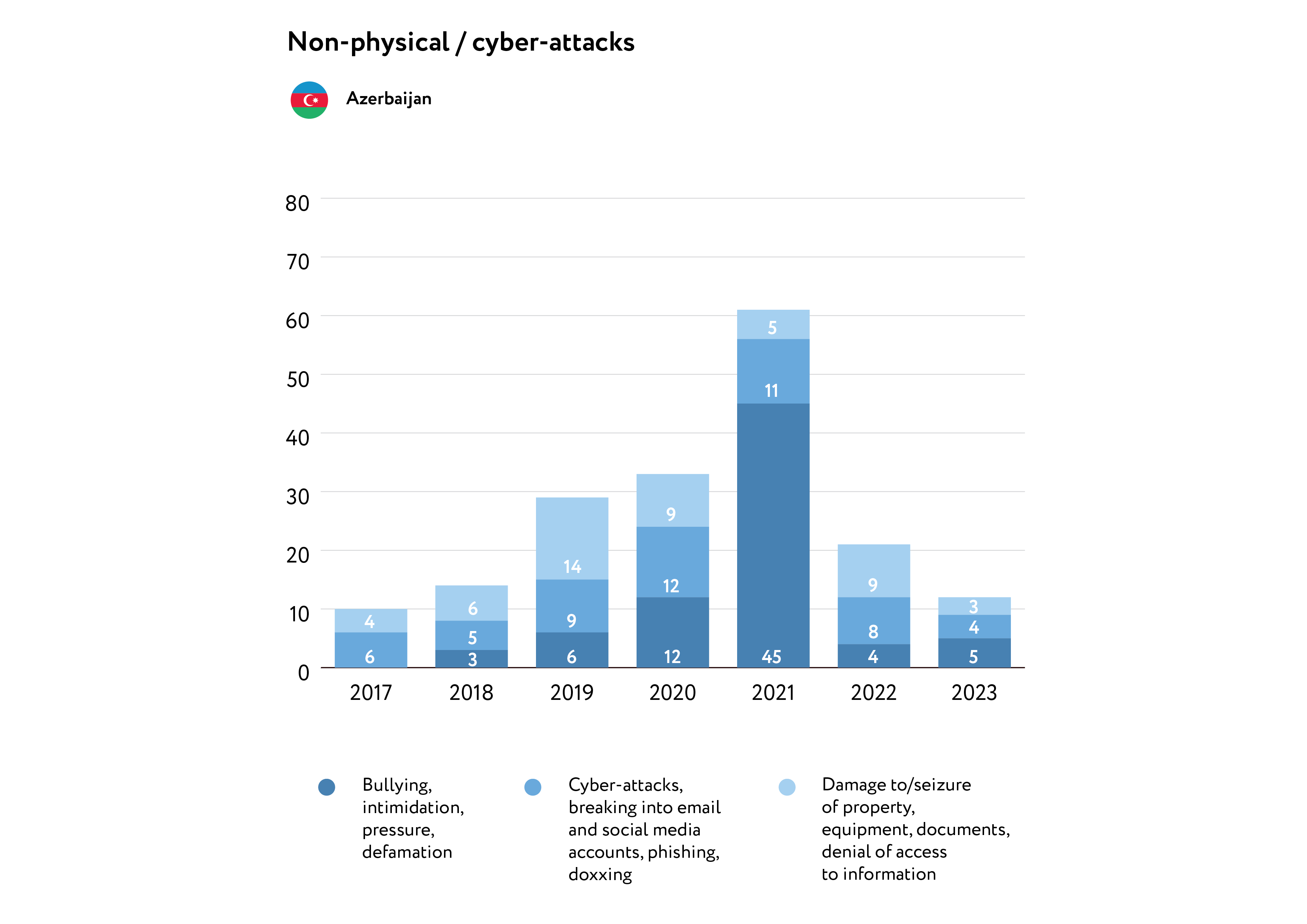
- On 26 February, Aitaj Ahmadova (Tapgid), a journalist with Meydan TV, had her personal correspondence stolen. Following the arrest of political activist Bakhtiyar Hajiyev, his messages with various women were hacked and published. Screenshots of his correspondence with Ahmadova were subsequently leaked to Telegram channels and Facebook pages.
- On 5 March, Bayraqdar Media‘s Facebook Page was hacked. The page was taken down and all content was deleted.
- On 2 March 2023, hackers attacked Müsavat TV’s online platform, compromising its emails and deleting materials from the channel’s database. A similar cyber-attack was carried out against the government-controlled Ses TV.
- At the end of 2023, the YouTube channel Kanal13, founded by Aziz Orujov, who had been arrested, faced relentless cyber-attacks. Anar Orujov, the co-founder of Kanal13, reported that the attacks intensified following Aziz Orujov’s arrest. The cybercriminals managed to delete several videos from the channel.
Other incidents include:
- On 10 February, it emerged that blogger Rashad Ramazanov was being subjected to psychological pressure. According to his wife, this pressure was instigated by the administration of the prison where he is serving a nine-year sentence on fabricated charges. “The prison operates a system of extortion, where prisoners are forced to pay for everything. Rashad refuses to comply, which is causing issues for his cellmates. Two of his cellmates are cooperating with the administration and are constantly harassing him, provoking him with insults. A month ago, I lodged a complaint via the penitentiary service’s hotline, but since then, the pressure on Rashad has only intensified,” his wife reported.
- On 27 March, Fadail Pashayev, the head of the media outlet Konkret.az, began receiving threatening and insulting phone calls from unknown numbers. According to Pashayev, these calls started following the publication of articles about Mardan Nehmatov, the head of the executive power department in the Shamakhi district. He also reported receiving threats from fake profiles on social media.
- On 28 March, the security service of the Baku Boulevard administration barred Xəzər TV journalists from filming in the Boulevard area without official permission. There are no legal restrictions on filming or gathering information in public spaces.
- On 6 December, pro-government media outlets published video footage showing Ulvi Hasanli, the imprisoned director of ABZAS Media, in various locations around the city. At the end of 2023, Hasanli and other ABZAS Media journalists, known for their anti-corruption investigations, were arrested on fabricated charges. It was later revealed that they had been under prolonged surveillance. The administration of the detention facility where Hasanli is being held has restricted his communication with his lawyer and family members, and has threatened to worsen his prison conditions if he continues to complain about the violations of his human rights.
6/ ATTACKS VIA JUDICIAL AND/OR ECONOMIC MEANS
In 2023, at least 116 attacks via judicial and/or economic means against journalists and media outlets were recorded in Azerbaijan. In 90% of cases, they were conducted by the representatives of authorities. Interrogations, searches, confiscations and court trials were among the main methods of pressure with 50 incidents recorded in this category.
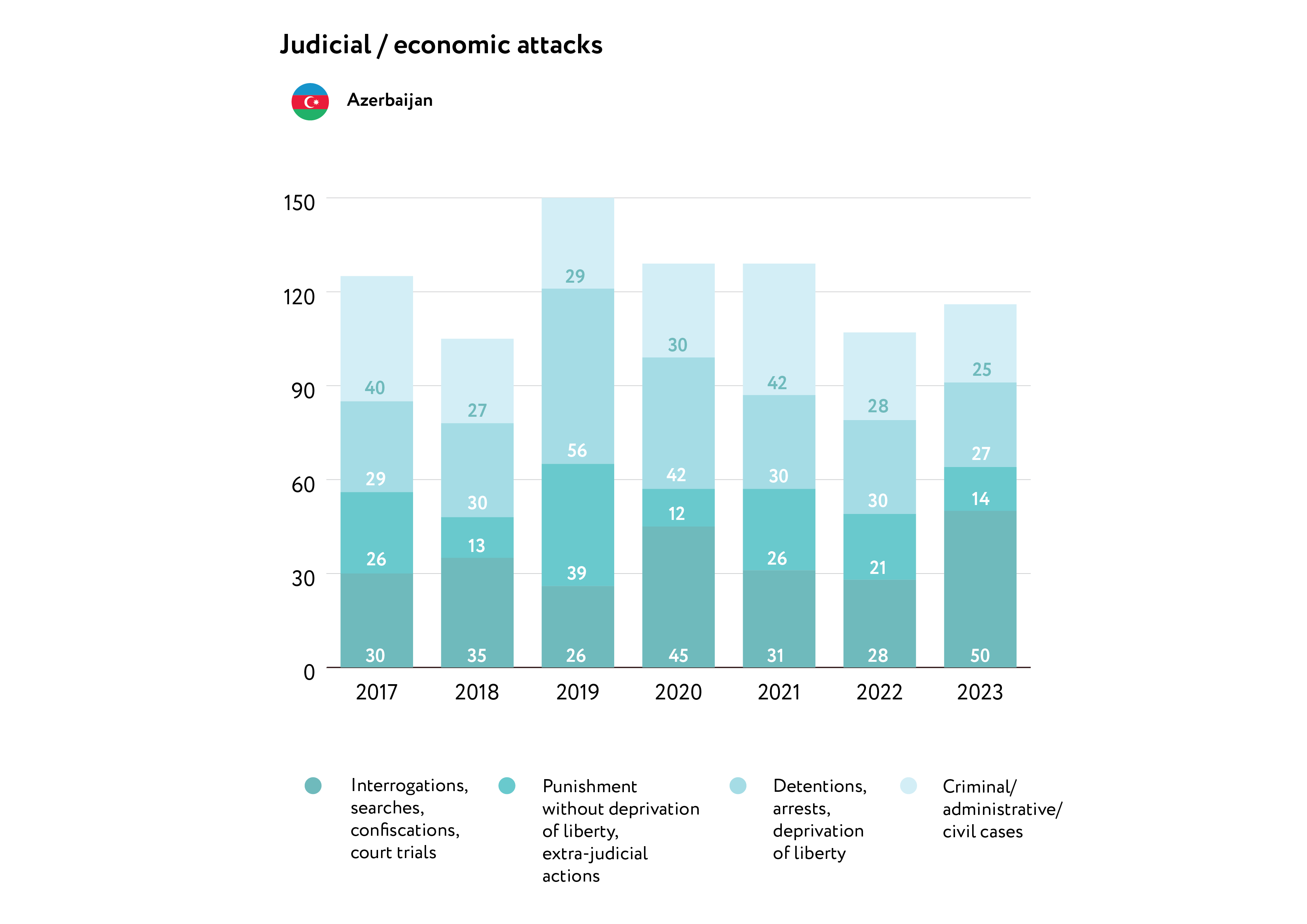
The wave of arrests of journalists and the crackdown on independent media at the end of 2023 led to the prosecution and arrest of many popular opposition media workers on various charges. During a search of the ABZAS Media office, €40,000 was allegedly found, which officials claimed were grant funds obtained from various donors and brought into the country illegally. Between November 2023 and April 2024, six ABZAS Media journalists were charged with “smuggling” and arrested. The detainees include ABZAS Media’s chief, Ulvi Hasanli; deputy chief, Mahammad Kekalov; editor-in-chief, Sevinj Vagifgizi; journalists Elnara Gasimova and Nargiz Absalamova; and Hafiz Babali, a journalist for both ABZAS Media and Turan Information Agency. They are currently held in investigative detention facilities. Government-controlled media outlets have published materials depicting these journalists as criminals. Journalists who previously collaborated with ABZAS Media—Shamistan Hexiyev, Mina Aliyarli, Sahila Aslanli, and Leyla Aghyeva—along with their family members, have also been summoned for interrogations.
The director and journalists of the online TV channel Kanal 13 also faced criminal and administrative charges. The head of Kanal 13, Aziz Orujov, was initially accused of “illegal construction” and detained. Shortly thereafter, he was charged with “smuggling.” During multiple searches of Orujov’s apartment and the media outlet’s office, authorities seized various belongings. TV anchor Rufet Muradli was detained for 30 days on charges of “petty hooliganism” and “disobedience to police orders.” Shamo Eminov, who had previously worked with Kanal 13, was arrested on smuggling charges. Searches were conducted in the homes of journalists in their absence. Those charged, along with witnesses in the case, had their bank accounts frozen, and travel bans were imposed against them. Authorities even blocked the pension bank cards of the mothers of Sevinj Vagifgizi, editor-in-chief of ABZAS Media, and Aziz Orujov, head of Kanal 13.
In November and December 2023, 12 additional media workers were arrested and/or deprived of their liberty on various charges.
On 12 December, the Narimanov District Court arrested Teymur Karimov, the head of the Kanal-11 YouTube channel, for four months pending trial on extortion charges. Karimov denied the allegations, attributing the criminal case to his journalistic activities. His lawyers argued that the charges were fabricated and baseless.
The following journalists are currently held in pre-trial detention centres and prisons under various charges:
- Avaz Zeynalli, chief of KHURAL Media, sentenced to 9 years on charges of extortion;
- Elnur Shukurov, head of the SADA TV YouTube channel, charged with receiving a bribe and causing illegal influence on an official’s decision;
- Zaur Gambarov, director of theSARKAZM.AZ portal, charged with hooliganism;
- Blogger Rashad Ramazanov, charged with drug trafficking;
- Arshad Ibrahimov, head of DUNYANINSESI.AZ, charged with extortion;
- Osman Narimanoglu, editor of DEMOKRAT.AZ, charged with extortion;
- İbrahim Humbatov (Gubadoglu), head of AZERINFO.AZ, charged with extortion;
- Matlab Bagirov, director of SalamNews Information Agency and İnterAz, charged with the legalisation of criminal assets (money laundering), smuggling, and tax evasion.
- Polad Aslanov, the head of the site XEBERMAN.COM, was arrested in 2019 and accused of treason. The upper courts reduced his 16-year sentence by only three years;
- Blogger Aslan Gurbanov was detained in 2020 and accused of public appeals against the state and incitement of national, social, or religious hostility. He was sentenced to seven years in prison.
Another commonly used method of pressure faced by journalists in 2023 was detentions, interference with their devices, and forced deletion of the materials they produced or captured. Some examples include:
- On 4 June, journalist Nurlan Gahramanli (Libre) was detained using physical force while covering the funeral of the son of political prisoner Mahir Azimov. He was forcibly taken to the police station but was released after an hour.
- On 4 December, independent journalists Aitaj Mammadli and Shahla Karim were detained and subjected to violence by executive authority officials and police officers while filming in Lankaran City. The video footage was deleted from Aitaj’s phone, and memory cards were removed from their video cameras. Shahla Karim reported, “The memory cards were returned only after we contacted Elshad Hajiyev, the head of the press service of the Ministry of Internal Affairs.”
At least six media workers were arrested in 2023 on administrative charges:
- On 26 January, journalist Aydın Janiyev was sentenced to one month of administrative arrest for “insulting posts” following a complaint from one of his journalist colleagues.
- On 5 February, photoblogger Veli Shukurov was sentenced to 30 days of administrative arrest. Shukurov, who was accused of “minor hooliganism” and “disobedience to the police,” had his lawyers declare that the accusations were fabricated.
- On 24 July, Vugar Mammadov, editor-in-chief of Hurriyat newspaper, YouTube channel, and news portal, was sentenced to one month of administrative arrest. He was charged with posting confidential information online and failing to prevent its leakage.
- On 21 September, journalist Nurlan Gahramanli was administratively arrested for “spreading prohibited information over the internet.” His family reported that officials in plain clothes forcibly took him from his home. During the trial, Gahramanli complained of physical injuries and moral pressure while in detention.
- On 2 December, the Khatai District Court of Baku sentenced Rufat Muradli, an employee of the online television channel Kanal-13, to 30 days’ administrative arrest. He was found guilty under Article 535.1 of the Code of Administrative Offences for failing to comply with the lawful demands of the police.
The provisions of the new Media Law, which came into force in early 2022, were fully implemented in 2023. The law mandates the creation of a state-controlled registry for all media outlets and journalists.
- On 14 November, the Media Development Agency, the state regulatory body overseeing the implementation of the Media Law, filed a case against the news portal dia.az (Dunya Information Agency), requesting the termination of its activities due to its exclusion from the registry. The court granted the complaint, ordered the cessation of dia.az’s activities, and the portal’s website was subsequently blocked.
- The Media Development Agency refused to include at least 10 media outlets in the Media Register. The newspapers Gundam Khabar, Daryaz, Mingachevir Ishiglari, Yeni Khabar, Real ve Ashkar, and news portals mi-news.az, az24saat.org, son-xeberler.az, gundemxeber.az, dogruxeber.az and Yenikheber.az, as well as journalist Vugar Alakbarov, were refused from inclusion in the Media Register. The affected media and journalists appealed to the court.
Other incidents of judicial attacks recorded in 2023 included:
- On 12 June, military expert Adalat Verdiyev filed a lawsuit against independent journalist Rahib Garib. The Binagadi Court ordered Garib to retract the information he had published and to issue an apology to the complainant.
- On 23 June, Ulvi Hasanli, director of Abzas.net, was detained on the grounds of the US Embassy in Baku while covering a protest by feminist activists regarding the events in Soyudlu village. Security officials from the Embassy apprehended Hasanli and the activists and handed them over to the police. Hasanli reported that he was subjected to physical violence during the detention and at the police station.
- On 22 July, the Surakhani District Court found Heydar Oguz, the editor-in-chief of the ovqat.com website, guilty of libel and sentenced him to six months of correctional labour. This case followed a lawsuit filed by Sara Azimova, a member of the Television and Radio Council of the Nakhchivan Autonomous Republic, on 2 March. Azimova had pursued legal action against Oguz and requested his arrest under a specific criminal procedure.
- On 5 December, Aygun Hasanova, a journalist with the Azertaj state information agency, was denied entry to New Caledonia. Despite holding a valid visa, she was detained by the police and deported as a “persona non grata.”
- On 13 October, the Narimanov District Court ordered the blocking of the Hurriyet TV YouTube channel at the request of the General Prosecutor’s Office. The court’s decision stated that the media outlet had disseminated prohibited information.
- On 11 December, at the request of the Ministry of Digital Development and Transport, the Sabail District Court ordered the blocking of access to Kanal 13. The court’s decision was based on allegations that the channel had broadcast false information about state officials and authorities.
ANNEX 1: OPEN SOURCES USED FOR GATHERING DATA (AZERBAIJAN)
- Azadlıq Radiosu – the Azerbaijani service of Radio Free Europe/Radio Liberty;
- Arqument.az – an Azerbaijani news site;
- Election Monitoring and Democracy Studies Center (EMDS) – a non-governmental organisation. Main goals — elections monitoring and the formation of democratic institutions in Azerbaijan;
- Freedom House – a non-profit organization based in Washington, D.C. It is best known for political advocacy surrounding issues of democracy, political freedom, and human rights;
- Gözətçi – a news site of Azerbaijan. The website aims to collate information on human rights violations;
- Meydan.TV – a weekly online television channel. Its mission — is to inform active members of society about the state of affairs in politics, the economy, and social life; to offer a platform for open and diverse discussions on all topical questions concerning Azerbaijani society;
- Reporters Without Borders – an international non-profit and non-governmental organization that safeguards the right to freedom of information;
- Turan – an independent news agency. The agency distributes news, analytical articles, and overviews from Azerbaijan;
- Toplum.TV – an Azerbaijani news site;
- Voice of America – a multimedia news organisation in the USA that produces content in over 45 of the world’s languages for audiences with limited access to a free press.
